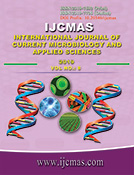


 National Academy of Agricultural Sciences (NAAS)
National Academy of Agricultural Sciences (NAAS)

|
PRINT ISSN : 2319-7692
Online ISSN : 2319-7706 Issues : 12 per year Publisher : Excellent Publishers Email : editorijcmas@gmail.com / submit@ijcmas.com Editor-in-chief: Dr.M.Prakash Index Copernicus ICV 2018: 95.39 NAAS RATING 2020: 5.38 |
The present piece of research work was carried out at the field of Dryland (Karewa) Agricultural Research Station, Sher-e-Kashmir University of Agricultural Sciences and Technology of Kashmir during kharif 2017 to determine the effect of planting density and nutrient management practices on the performance of maize hybrids. The experiment comprised of three factors with two maize hybrids viz. Kanchan-101 and Bio-605 as main-plot treatments and two plant geometries viz. 60×20 cm (83,000 plants ha-1), 60×15 cm (1,11,111 plants ha-1) and three nutrient management practices viz. RDF (Recommended Dose of Fertilizers), SSNM (Site Specific Nutrient Management) and FP (Farmers Practice) as sub-plot treatments replicated thrice The results of the experiment revealed that highest plant height, leaf area index was found higher with plant population of 1, 11,111 plants ha-1 However, highest functional leaves plant-1 was found higher with plant population of 83,000 plants ha-1. The results showed that balanced fertilization of maize crop involving nutrient combinations of N, P and K applied as per Site Specific Nutrient Management (SSNM) recommendation most effectively enhanced growth parameters viz., plant height, functional leaves, chlorophyll content and leaf area index. From present study it can be concluded that maize hybrid Bio-605 under 60×20 cm spacing (83,000 plants ha-1) with Site Specific Nutrient Management (SSNM) found better suited for temperate conditions of Kashmir as it gave the higher gross profit (164770 ha-1), net return (112132 ha-1) and B C ratio (2.13).
 |
 |
 |
 |
 |